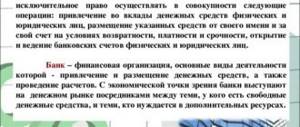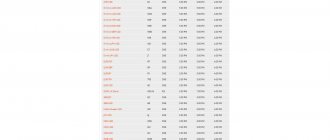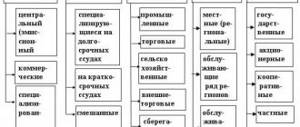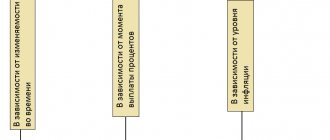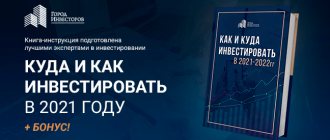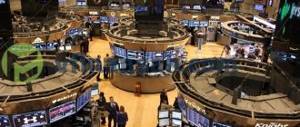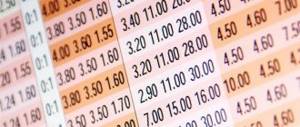Hello, dear reader!
According to Bloomberg (autumn 2021), the capitalization of the global stock market in the global economy has exceeded $80 trillion. An assessment of the dynamics allows us to conclude that the market has reached the $100 trillion mark. in the next year or two.
For comparison, the expenditure side of the Russian Federation budget in 2019 amounted to 18 trillion. rub. Or at the rate $1=64 rubles. — 281 billion dollars. The stock market is the topic of conversation today.
Why do we need an exchange?
Some people consider the stock exchange to be a collection of speculators trading air, or another “MMM” pyramid. In fact, exchanges have nothing to do with pyramids. This is the same financial institution as, for example, a bank.
For clarity, let's look at an example. One person has a business, and the other has money. The second one noticed that the first one’s business was developing successfully. He came to him and said that he was ready to invest his savings in the business, but on the condition that he would be paid a constant percentage of the profit (that is, he wanted to become a co-owner of the business). The first one thought and agreed, they finalized the deal.
Now try to imagine that there are millions of such people: some have a business, some want to invest their money, and some have changed their minds and want to sell their share. In order to somehow regulate these processes, a company is needed that will take on the function of organizing trade transactions between buyers and sellers of securities and controlling them.
IMPORTANT! Exchanges are precisely organized trading platforms that operate according to certain rules, ensure maximum concentration of supply and demand, and also help create free competition.
Demand
Demand for securities is determined by the standard of living in the state. The higher the standard of living, the more opportunities the population and companies have to purchase securities. In addition, supply is predetermined by demand, which means the higher the supply, the higher the level of development of the mechanism for supplying credit sources to issuers.
The number of foreign valuable assets that circulate on state markets is the most important indicator of the efficiency and development of a national economy. market, its accessibility for investors.
Developed systems and those that are still in their infancy differ significantly in this criterion. If in an already developed market this figure fluctuates around 10%, then in a developing one it remained below one percent for a long time, and only the attraction of foreign investments made it possible to bring the Mexican stock exchange to the level of two percent.
There are the following directions:
- globalization (internationalization), formation of a single euro zone;
- institutionalization, increasing the importance of institutional capital in corporate management;
- technologization, departure from standard trade and the formation of the latest innovative trading systems on the Internet;
- Reducing the number of securities exchanges when trading takes place on the largest exchange in the country;
- dematerialization, when there is a transition from paper to electronic securities;
- enhanced protection of private investment, and protection of minority shareholder rights;
- rapid growth of market shares when there are mergers and acquisitions of organizations.
Also, on international platforms there is active trading in securities that were denominated in foreign currencies.
A security is a document of a special regulated form that has certain details that certify financial rights, define the relationship of the issuing person, and foreshadow the implementation of all obligations under the terms of placement of securities and the possibility of transferring rights that arise from this documentation to third parties.
Stock market structure
The structure of the stock exchange is built on: brokers, regulators, issuers, investors. All of them are important for the functioning of the exchange and if one of them is excluded, the exchange will cease to exist in its previous form.
Brokers
The job of all exchanges is to provide the opportunity to conclude transactions and conduct their work for brokers in the financial markets. Brokers can enter into transactions on behalf of large banks, institutions and private clients. It is brokerage companies, and not the stock exchange itself, that provide the opportunity to trade in the stock market for everyone.
When starting your work on the stock exchange, you should choose a brokerage company for your service on it.
At a brokerage company, you should go through the registration procedure, replenish your trading account and start trading.
Before you start trading activity, you need to get information about how the stock market works, what risks are present in it, familiarize yourself with service tariffs, broker guarantees and other important aspects.
Every private investor must undergo training in trading on the stock exchange, understand the possible risks and practice on a demo account. For example, the following brokers provide a demo account for trading the stock market.
Regulators
Regulators are designed to control brokerage companies and their activities. If a broker is found to be in violation, his license may be revoked and his clients may be transferred to another brokerage company.
Thanks to regulators, there are fewer violations in the stock market than in the Forex currency market.
Issuers
Issuers are companies that have issued securities for circulation on the stock exchange. Issuers are private enterprises and government agencies.
The government issues only fixed income bonds to the market. Guaranteeing the return of all invested funds plus a fixed income within a certain period specified in the bonds.
Government guarantees on their bonds are the most reliable among the guarantees of other participants on the exchange.
Enterprises issue shares and bonds. Enterprises do not guarantee return of face value and in case of bankruptcy, investors will lose all the money invested in such enterprises. That is why you should give preference in investing to securities with state protection.
Investors
Investors are participants in the stock market who provide additional capital both for the expansion of enterprises and commissions to brokerage companies and other organizations on the stock exchange. It is thanks to investors that the entire structure of the stock market works.
Special Institutes
The Russian stock market, in addition to the stock exchange and brokers, has a number of other important elements.
Special institutions related directly to the stock market, in addition to the Federal Tax Service, brokers and the stock exchange itself, include two important organizations:
- National Depository Center (NDC). The databases of this institution contain all the archives of transactions ever carried out on the MICEX - RTS. Also on the servers of this organization are stored all registers of shareholders, records of who owns what securities.
- The National Clearing and Settlement Center is an organization that carries out mutual settlements for all transactions made during a trading session on the stock exchange.
In addition to these two special structures, without which the full operation of the exchange is impossible, the Russian stock market also has a number of organizations involved in auditing joint-stock companies - audit companies. This also includes investment banks through which securities transactions take place,
Main functions
The issue of the functions of the stock exchange can be divided into two parts: the functions of the stock market in general and the tasks of the stock exchange in particular. Let's start with the first question, which is fundamental to understanding the tasks of the exchange.
The function of the stock market is to redistribute funds. In simple terms, the purpose of securities is to take from those who have a lot of money and give it to those companies that need it.
In this it is similar to the banking (credit) system. But the only difference is that securities are a more interesting financial instrument from an investment point of view. And also more risky.
It follows from this that the functions of the stock exchange are to provide the opportunity to trade securities.
This is achieved by performing three tasks:
- Indicative – assessment of the value of a security. Now this function is fading into the background, giving way to market valuation. But once upon a time it was the exchange that determined how much a particular security was worth, and its value among traders already depended on this;
- Intermediary – creating the necessary conditions for cooperation between issuers, investors and other categories of participants;
- Regulatory – organization and supervision of trading in the securities market.
But we can highlight one and the main function of stock exchanges - organizing trading in securities. This is precisely why a huge stock exchange apparatus is being created.
It is important to remember that the stock exchange cannot combine its professional activity with others. You cannot organize trades, trade, or provide brokerage services.
Brief history of formation
The Russian stock market has a short history since the adoption of a course to liberalize the country's economy in 1991.
Can be divided into three periods:
- The emergence of the market from 1992 to 1998. At this time, it began to grow rapidly, which was accompanied by the widespread development of exchanges of various functional areas. In the mid-90s. The Russian stock market consisted of about 1000 exchange platforms. Some traded consumer goods, oil, timber, coal, carrying out transactions mainly through barter schemes. Others traded exclusively in foreign currency, while others worked in the GKO market and were engaged in voucher privatization.
- 1999 to 2008 After the crisis and default of 1998, the number of exchange platforms decreased significantly. There are only a few large regional stock exchanges left and two of general federal significance - RTS and MICEX. Shares of leading Russian companies were traded on them, IPOs were carried out, and OFZ trading began, including for the population. At this time, the Russian stock market was experiencing a real boom - money not only from Russian investors, but also from foreign ones flowed into it en masse. At the best time, their share reached almost 40%.
- 2008 to 2021 After the crisis, the Russian stock market lost a lot of its value - most non-resident investors left the Russian market irrevocably. They “stole” more than 200 billion dollars from him. True, there are still non-resident investors in OFZs, where their share reaches about 30%. The Russian stock market has become highly volatile, and many companies have left the market altogether, having been delisted on the stock exchange. More than 2/3 of the capitalization of the entire market is concentrated in shares of 40–50 issuing companies, which is not attractive even for a long-term investor.
Types of stock exchanges
By organization, the following types of stock exchanges can be distinguished:
- Public law. Fully controlled by government agencies. The government is responsible for appointing key personnel and setting tender rules. For example, in France, the creation of only such platforms for stock trading is allowed.
- Private. Such exchanges are created with private capital and operate under the management of employees of a private company. The state in them acts only as an “arbiter”, establishing the rules of bidding. Such exchanges are more popular, they are common, in particular, in the USA. This allows sites to be more flexible and “creativity” in their work and development. The New York Stock Exchange allows only individuals to operate. Every major financial company that wants to interact with the NYSE must pay for a seat on the exchange and hire a separate employee for it. The London Stock Exchange also operates as a private company. Its founders and managers are large brokers. All of them are members of the governing council, and decisions are made based on the results of their voting.
Foreign exchange
If we consider the main types of exchanges, then individual currency exchanges are almost never found. They exist as sections of universal trading platforms. They carry out transactions to purchase one currency for another with a minimum exchange rate spread. Therefore, the main participants in such trades are financial institutions that purchase the necessary currency for the transactions of their clients.
If a company needs to pay for imported goods in foreign currency, then it instructs its bank to purchase the necessary currency. He, in turn, places an order on the currency section, which is executed by sellers.
Unlike the banks themselves, which conduct exchange transactions, currency exchanges have the entire infrastructure for direct trading between sellers and buyers. Bidders see all orders for purchase and sale, and are free to satisfy any of them. For individuals, access to currency sections may be difficult due to high requirements for minimum transaction amounts.
Legality
All stock exchanges are legal. Their activity involves multiple checks by a variety of authorities and regulators, which leads to fair terms of cooperation, although sometimes not entirely beneficial for entrepreneurs and investors.
You can safely work on the stock exchange without fear of fraud. But among issuers, sometimes there are exchange cases of their investors, which involve “inflating a soap bubble.” In such cases of “bubbles”, stock prices grow at a high rate (exceeding the return of 100% per annum) for several years, after which the enterprise goes completely bankrupt with the loss of all investments by investors.
That is why, before you start trading in financial markets, you should familiarize yourself with the possible risks and tools for making money. Understanding the risks will help protect your investment.
Advantages and disadvantages
The very essence of trading is such that there is no point in talking about the pros and cons of trading. For some, the stock exchange is an obvious benefit. For others - scam and scam.
Personally, I see for myself the following advantages of stock trading today:
- easy and convenient trading;
- unlimited potential for return on investment (in theory);
- there are options for trading on the stock exchange with any starting capital;
- high market liquidity.
It is always profitable to trade, even if markets are falling.
There are also disadvantages to exchange trading, the most significant of which are:
- high risk of losses;
- tax uncertainty (if you trade somewhere else besides the Russian market);
- high theoretical barrier to entry.
The latter means that without a good study of the technicalities of the stock exchange and minimal practice, stock trading takes on the characteristics of a casino. A thoughtless bet in the hope of success. But this is not our path, so I continue to talk about exchanges and trading.
Stock exchanges in Russia
Now there are several exchanges operating in Russia, each of them has a mixed structure, that is, they conduct trading in stock assets, currencies, precious metals, various contracts, etc.
The Moscow Exchange has the largest trading volume in Russia. You may also be familiar with regional exchanges in St. Petersburg, Vladivostok, Novosibirsk, etc. The exchange in St. Petersburg is now beginning to provide its clients with services for entering the international market.
Let's take a closer look at the structure of the functioning of the Moscow Exchange, which is actually a financial group consisting of the Depository, the Clearing Center, as well as other divisions designed to ensure the functioning of the exchange. The Moscow Exchange has three main trading divisions: stock, foreign exchange and derivatives markets.
Trade
Trading is about making a profit from changes in the exchange rate of shares or other assets. With active trading, you can buy shares both long (buy assets) and short (sell assets).
Most players on the stock exchange trade long, receiving, in addition to profit from exchange rate differences, additional income in the form of dividends. Dividends are interest accrued to the investor (share owner, long buyer) on the profit received by the enterprise.
Best brokers
To realize your investment plans in the stock or bond market, you cannot do without an intermediary - a broker. The Russian Financial Markets has several brokerage companies that have many years of experience working with Russian investor clients.
Reliable Russian brokers
| Name | Rating | pros | Minuses |
| Finam | 8/10 | The most reliable | Commissions |
| Opening | 7/10 | Low commissions | Imposing services |
| BKS | 7/10 | The most technologically advanced | Imposing services |
| Kit-Finance | 6.5/10 | Low commissions | Outdated software and user interface |
How do they earn money?
You can earn real money on the stock exchange, and the success of the business depends not only on the starting capital. It is important to choose the right way to earn money. There are two main directions:
- Trading is suitable for those who are ready for daily hard work and will devote a lot of time to trading.
- Investments are a way for those who want to receive additional passive income and are not ready to constantly engage in stock exchange activities.
For novice investors who are determined to make money on the stock exchange, it is better to follow this plan:
- Gain basic knowledge and skills, understand trading terminology, and learn the basics of economic analysis. This knowledge will be useful in any case.
ATTENTION! Training material can be found on the websites of brokerage companies and dealing centers. There you can also try your hand at trading by opening a demo account (without the participation of real money).
- Decide on your strategy: a trader (this is an active player who always “keeps his finger on the pulse” and has a good command of the market situation, he counts on short-term profits and makes money on price fluctuations) or an investor (focuses on long-term profits from 2-3 years, buys securities not for resale, but as a share in a business, evaluates the prospects of a particular company, and not the situation on the stock market).
- Choose the right broker, focusing not on advertising promises, but on specific conditions and your own needs.
List of indexes
The Russian stock market has only two main indices. These are two indicators:
- MICEX index - MOEX or MOEX 10.
- RTS Index - RTS.
In addition, the Russian stock market has a number of specialized indices that reflect business and market activity in the market in its various sectors:
- Oil and gas index - index code MOEXOG.
- Electricity Index - index code MOEXEU.
- Telecommunications Index - index code MOEXTL.
- Metals and Mining Index - index code MOEXMM.
- Finance index - index code MOEXFN.
- Consumer sector index - index code MOEXCN.
- Chemical and petrochemical index - index code MOEXCH.
- Transport index - index code MOEXTN.
- Moscow Exchange Index - RSPP Responsibility and openness.
- Moscow Exchange Innovation Index - index code MOEXINN.
- MOEX Russia Total Return - index code MCFTR.
- Moscow Exchange Government Bond Index - index code RGBITR.
In addition to these main indices, the Moscow Exchange calculates several dozen more different technical indices, which can be found in more detail directly on the exchange’s website by following the link:
https://www.moex.com/ru/indices
Investments vs trade. What to study for trading and investing on the stock exchange
We have come to the most multifaceted and interesting issue that everyone will have to study on their own. Here you just need to decide on the terminology and some reference literature.
Trading on the stock exchange is the execution of transactions for the purchase and sale of securities in order to make a profit. This is real trading, according to the principle “buy cheaper, sell more.” Suitable for those who want to make money on the stock exchange.
Investments are investments of funds for the purpose of making a profit. This is a more passive way, when we buy stocks or bonds and wait for interest to flow from them. The income is slightly more than a bank deposit, but coupled with the increase in price, we will have a decent profit that will cover inflation and increase funds.
Now about what you can learn for trading on the stock exchange:
In fact, any online manuals or exchange player forums are suitable here. All relevant and up-to-date information about trading strategies, signals, and other trading assistants can be found in the public domain.
But since the main component of trading is technical analysis, every trader should still have one book - Technical Analysis - Jack Schwager. This is an excellent textbook, thanks to which you can perfectly understand technical analysis and start analyzing with the help of charts.
Alexander Elder is also suitable - the basics of stock trading. This book provides an understanding of all the mechanisms of the stock market and several timeless strategies.
The Investing Bible is a book by Benjamin Graham - The Intelligent Investor. After reading it (it is important that it is in the latest edition), you will no longer have to look for other manuals and start investing money. With this book you can increase your capital several times in just 5-6 years.
How likely is a collapse?
Stock market crashes or collapses, as practice shows, never come when everyone expects them. So it is this time - the whole world is waiting for the collapse of the American, Chinese or European stock markets. But this doesn't happen. There is a simple reason for this - the governments of all leading countries are printing money, which stimulates the growth of both the stock market and consumer lending.
It is difficult to say how long this financial pyramid will grow. But, as one famous investor W. Buffett says, “trees don’t grow to the sky, and neither do stocks,” and neither do stock markets.
The Russian stock market, including over-the-counter securities, is a 100% reflection of all global trends. Therefore, as soon as a real collapse begins on world stock exchanges, Russian investors will immediately notice and feel it.
Top stock exchanges in the world
Currently, there are a large number of stock exchanges around the world. Today there are more than several hundred of them. They differ in their level of service and the tools they provide. Investment companies and many other market participants trust those that have a high level of reliability.
There are several stock exchanges in the world that have already proven that traders and other market participants can trust them.
New York Stock Exchange
Previously, in New York City, the purchase and sale of instruments such as securities was carried out through two exchanges:
- NYSE
- Euronext. NYSE Euronext
Ten years ago they merged. Now both of these institutions have one common concept - the New York Stock Exchange. It is characterized by its high level of influence in the world. She is almost always in first place in the ratings. The capitalization volume of this exchange is simply huge. It amounts to 13 trillion dollars. Shares of three thousand of the most influential companies on the planet are traded here.
Moscow Exchange
In Russia, the Moscow Exchange is of great importance. She has an excellent reputation and many clients. It offers great trading opportunities in stocks, bonds and currencies, commodities, options contracts and much more. In the ranking of world stock markets, the MICEX is in the top twenty.
This exchange strives to become better and better every year, because it employs a team of specialists who develop the most favorable conditions for cooperation so that investments bring them a stable income.
The Moscow Exchange is relatively young. It has existed since 2011. She uses European experience in conducting transactions. It consists of the following scheme: T+2. This means that clients receive full payment for a completed transaction two days after its opening.
Tokyo Stock Exchange
This exchange is one of the oldest at the moment. It was formed in 1878. It always ranks among the top three most influential institutions in the financial world. It cooperates with 2,300 major companies, which are represented, among others, by banking organizations. Its participants are divided into the following categories:
- Saitori (they represent intermediaries)
- connecting companies
Almost 80 percent of Japan's exchange turnover comes from the Tokyo Stock Exchange.
Hong Kong stock exchange
This exchange was founded in 1861. It is regularly ranked among the top twenty stock exchanges in the world. The main stock index of this institute is the Hang Sang. It is thanks to him that the efficiency of the Hong Kong stock market is reflected. It takes into account a large number of shares of the largest companies in the city.
London Stock Exchange
Its history began in 1570. That's when she was educated. Here, securities of leading companies in the city of the country, and even the world, currencies, goods, etc., take part in trading. It is open to cooperation with global companies. This is what sets her apart from everyone else. It has its own index, called FTSE100. It is with its help that the success of the entire economy is analyzed.
TOP 10 largest stock exchanges in the world:
| 10 | Bombay Stock Exchange |
| 9 | Madrid Exchange |
| 8 | Toronto Exchange |
| 7 | Shanghai Exchange |
| 6 | Frankfurt stock exchange |
| 5 | London Stock Exchange |
| 4 | Euronext |
| 3 | NASDAQ Stock Exchange |
| 2 | Tokyo Stock Exchange |
| 1 | New York Stock Exchange - NYSE |
Sources
- https://AboutCash.ru/chto-takoe-fondovaya-birzha/
- https://www.finam.ru/education/likbez/birzha-chto-eto-takoe-i-zachem-ona-nuzhna-20190531-20116/
- https://kakzarabativat.ru/investirovanie/fondovaya-birzha/
- https://ruscoins.info/investicii/vidy-finansovyh-birzh-24497/
- https://VFinansah.com/other/vidy-birzh
- https://strategy4you.ru/finansovaya-gramotnost/vidy-birzh.html
- https://www.finanbi.ru/chto-takoe-fondovaya-birja-783
- https://www.iqmonitor.ru/investicii/forex/all/fond-birga.html
[collapse]
